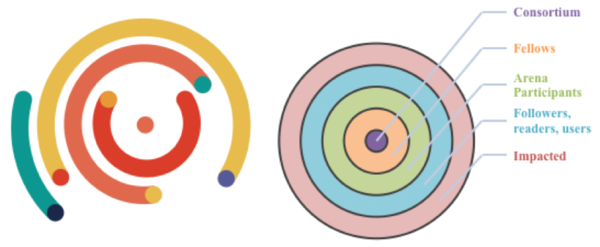UrbanA Community of Practice case study
The following is a submission from the UrbanA Community of Practice team for the BLAST project, which is also supported by UrbanA consortium partner ECOLISE. BLAST stands for BLended Adult Learning for the Social-ecological Transition. It was written in September 2020.
The UrbanA Community of Practice for Sustainable and Just Cities
UrbanA (Urban Arenas for Sustainable and Just Cities) is a three-year project in the EU’s Horizon 2020 programme. Its aim is to map, distil, synthesise and evaluate knowledge from previous EU research, and package the findings as practical and policy interventions that can promote urban sustainability and justice. It does this through a co-creative process, involving city makers from diverse fields of action across Europe and beyond.
Central to UrbanA’s knowledge co-creation process is a Community of Practice (CoP) on Just and Sustainable Cities. Facilitated by the UrbanA consortium, the CoP operates as an open network of individuals committed to taking constructive action towards more just and sustainable cities. CoP participants engage with the syntheses and analyses originally produced by the UrbanA consortium at different levels of commitment (Figure 1). This engagement combines in-person, online and asynchronous forms of collaboration.
Figure 1: Levels of Engagement in the UrbanA Community of Practice
At the heart of the Urban Arena process are four arena events, co-creative spaces where around 60 city-makers and city-thinkers from across Europe come together to reflect on a particular set of project outputs. The first Arena event addresses approaches to urban sustainability and justice, the second challenges that arise from applying these approaches, the third the learning opportunities that these challenges provide, and the fourth at policy measures through which to apply this learning. Arena participants - including consortium partners, 25 UrbanA Fellows who attend all four Arenas and contribute to the project in an ongoing way, plus around 20 others who may attend one or more - form the core of the UrbanA CoP (Figure 1). The first Arena event took place in Rotterdam in November 2019. The second, in June 2020, was due to take place in Barcelona but moved to a wholly online format due to the coronavirus pandemic. Arena events are also scheduled for Berlin in March 2021 and Brussels in September 2021, if conditions allow such gatherings at those times. Alongside the main Arena programme, UrbanA partners have organised more focused side events targeted at local/national audiences, including a local Arena in Lisbon and screening of a film in Rotterdam about urban housing issues.
In-between Arena events, a number of other media support ongoing connection, sharing and collaboration among CoP members:
- A newsletter giving monthly reports on all that is happening in the UrbanA community.
- A LinkedIn group where members are invited to share anything relevant to the community’s domain of shared interest.
- A space for interaction and learning on the Communities for Future collaboration platform, including discussion fora and shared documents.
- Online Community Conversations (CoCos), usually taking place once or twice a month, organised and hosted by CoP members. Deliberately avoiding standard presentation-heavy webinar formats, UrbanA CoCos usually involve one or two CoP members giving a short presentation about their work, leaving as much space as possible to questions, comments and exchange. Presentations and reports from CoCos are posted on the UrbanA YouTube channel and blog.
- A podcast series, available on Spotify.
- Various social media channels, including Twitter, Instagram and Facebook, with use of the #SustainableJustCities and #UrbanACoCo hashtags.
A key medium for knowledge co-creation by CoP members is the Wiki on Just and Sustainable cities, an important part of UrbanA’s knowledge commons. The wiki houses several databases of UrbanA outputs in open source, modifiable formats. All CoP members are invited to create a Wiki account, and contribute to extending the knowledge base by commenting on, editing or adding to it. Consortium partners encourage contributions from other CoP members via a call for co-creation, followed by a Community Conversation, the video and blog post from which are important learning materials for CoP members. Wiki content is subject to a Creative Commons 4.0 licence, which allows reuse for non-commercial purposes providing the source is attributed and the share licensing applied.
